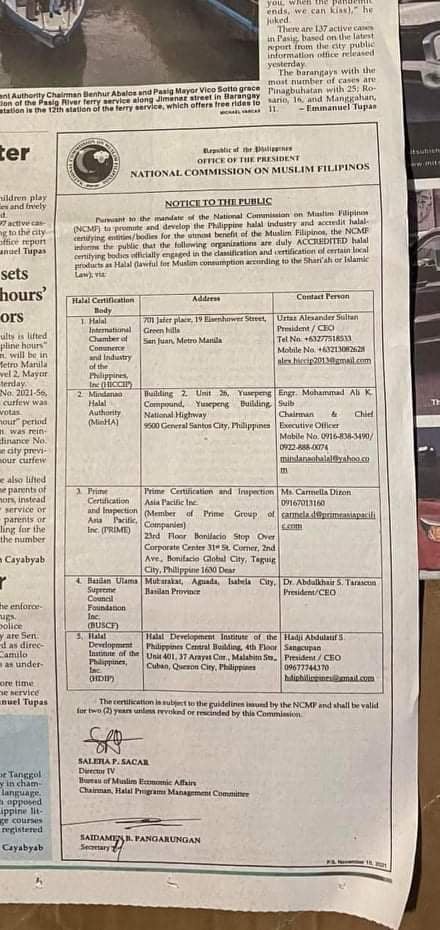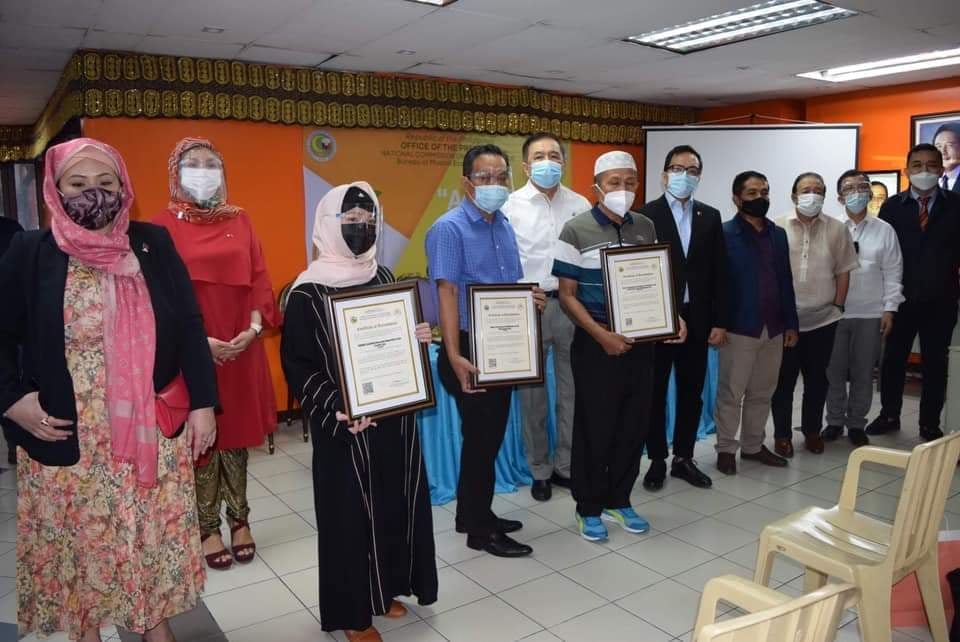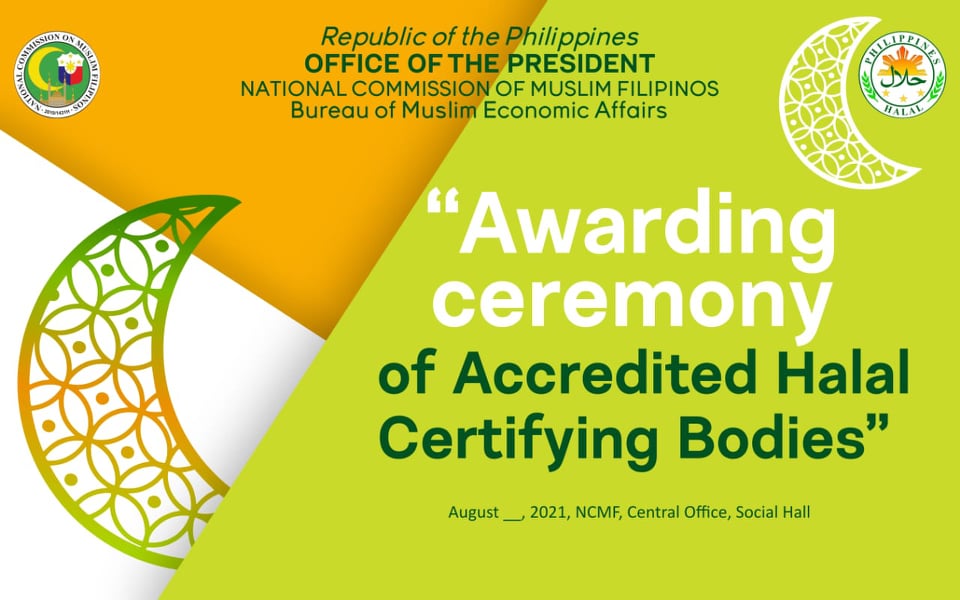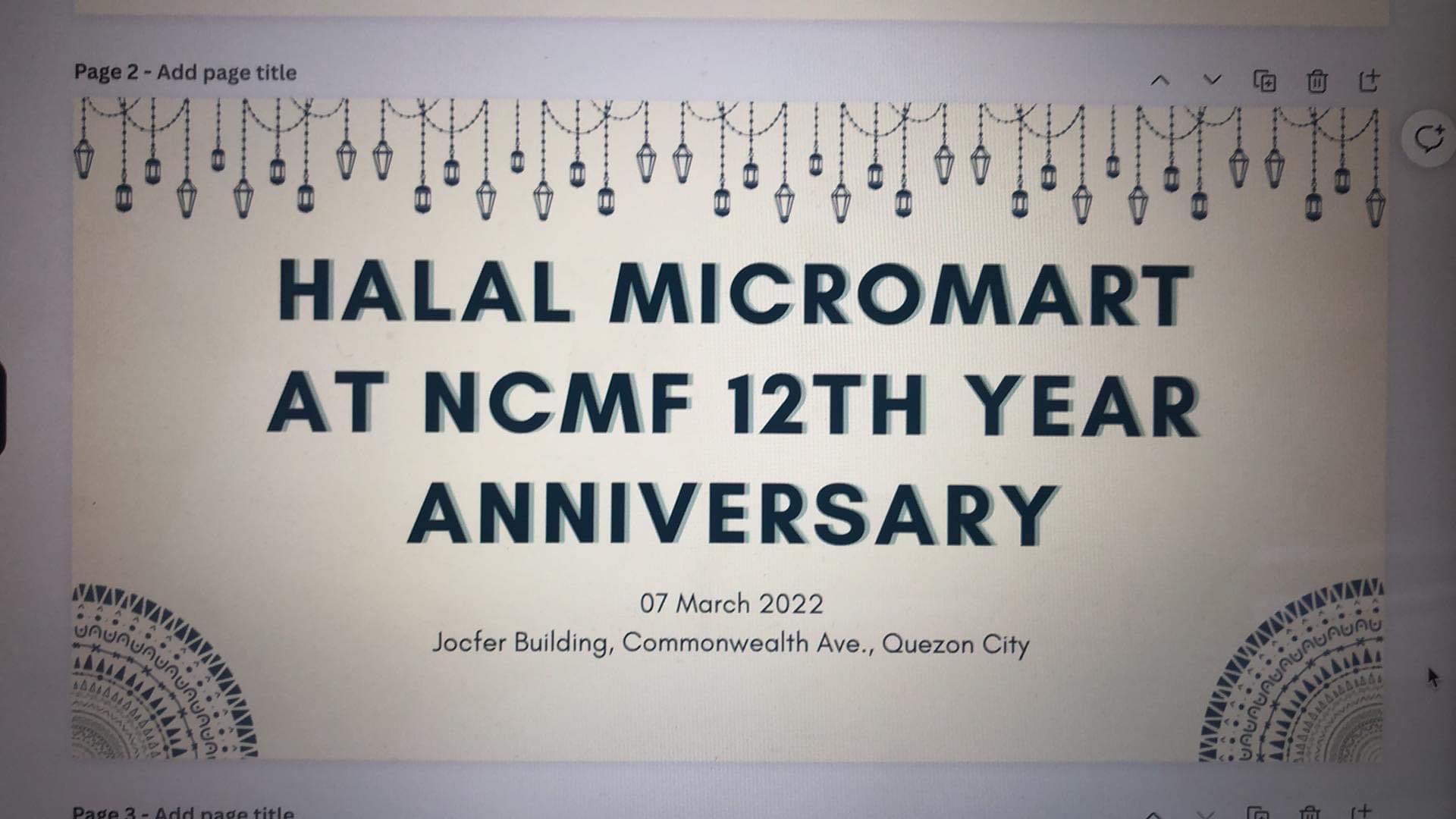the national commission on muslim filipinos (NCMF)
Is the government agency created by virtue of Republic Act (RA) No. 9997 mandated to promote and develop the Philippine Halal industry and accredit halal-certifying entities/bodies for the utmost benefit of Muslim Filipinos and in partnership or cooperation with appropriate agencies, individuals and institutions here and abroad. It is also responsible “to preserve and develop the cultural tradition, institutions, and well-being of Muslim Filipinos”.
at preset, the NCMF through the Bureau of Muslim Economic Affairs (NCMF BMEA) has remarkably institutionalized Two (2) major programs which are conducted regularly by the implementing arms of the Commission. This includes programs and projects on Islamic Banking and Finance pursuant to Republic Act No. 11439 (“Islamic Banking Act”) which was signed into law on August 22, 2019. The Islamic Banking Act provides for the organization, regulation, and powers of Islamic banks to be established in the Philippines. There is great potential for correlation between Islamic finance and the halal industry in terms of financing, completing the halalness of the product or service, profit- maximization, and stabilization and expansion for both the halal and Islamic finance industries. Each industry (halal and Islamic Finance) can provide a source of stability for the other.
The 2 major programs of the NCMF are the Halal Awareness Program (HAP) and the Accreditation of Halal Certifying Bodies.
The purpose of HAP is to provide the participants with an understanding and increase their awareness of the principles and concepts of halal. This is conducted through forums, seminars, and lectures.
Accreditation is the activity by which the NCMF formally recognizes the competence of the Halal Certifying Bodies (HVBs) intending to certify products to ensure their features and quality are in accordance with the rules established by the Islamic laws and allows the use of the mark Halal. The noble purpose of halal certification is considered as the benchmark for food safety, quality assurance, and other standards that give importance to Muslims and non-Muslims alike. The concept of halal food surpasses mere religious values and becomes more of a standard of hygiene and cleanliness. A few systematic studies show that the halal logo is perceived to be a quality assurance mark among non-Muslim communities because food is very clean and is processed and manufactured with very hygienic methods, it has a very low rate of incidences of food poisoning and contamination. This is also in line with one of the priority programs of President Ferdinand Romualdez Marcos Jr, which is Food Security.
Among the significant outputs of the conference were the following:
1. Adopted a Manifesto submitted to President Rodrigo Roa Duterte for the passage of enabling law strengthening the Philippine Islamic Banking and Finance which to this date has been in place through Republic Act 11439or an “Act Providing for the Regulation and Organization of Islamic Banks”;
2. A Resolution submitted to the President to give financial support for the development of the domestic Halal industry to include in his priority policy agenda;
3. Provided guidance to some LGUs for the enactment of Halal Ordinance and to sustain the same effort;
4. The signing of a Memorandum of Agreement with one of the prestigious culinary schools, the Center for Culinary Arts (CCA) to establish halal kitchen and culinary training programs;
5. The signing of a Memorandum of Understanding with the ASA Philippines Foundation to formulate Islamic finance organizations in the Cebu and Cotabato areas;
6. Established a more resilient partnership with the internationally known halal institutions like JAKIM, SANHA, and Brunei to help develop the country’s halal industry;
7. Embarked on the compilation of Module on Halal Skills Training and Halal Auditors which is now in its presentation in the forthcoming IIFC.
The Commission through the Bureau of Muslim Economic Affairs (BMEA) also came up with an MOU with the Local government of Marawi City for possible collaboration in the establishment of Halal Hub in the area and to enhance the effective implementation of halal standards and policies;
On July 2021, another MOU was also signed between the Philippine Economic Zone and the NCMF for Partnership in the promotion of investments in the Philippines particularly to provide assistance to foreign entities in facilitating business operations of investors within the areas of Mindanao;
Recently, the NCMF together with the Bangko Sentral ng Pilipinas and BARMM signed a Joint Circular. This JC establishes the Shari’ah Supervisory Board (SSB) whose functions shall issue Shari’ah products in the BARMM. It may also advise the BSP on Shari’ah matters related to Islamic Banking and Finance and may conduct Shari’ah compliance assessment if the BSP deems it necessary.

















